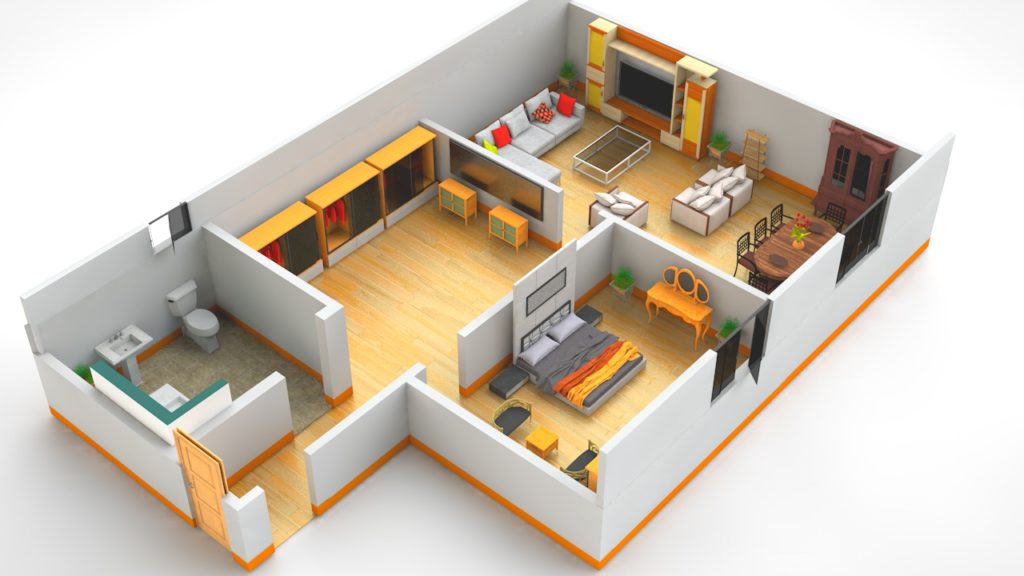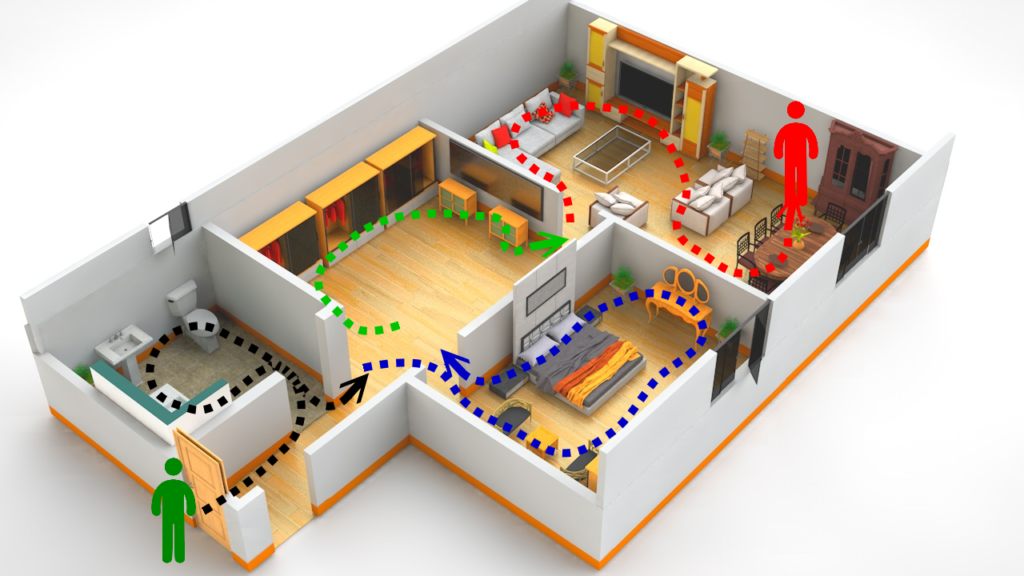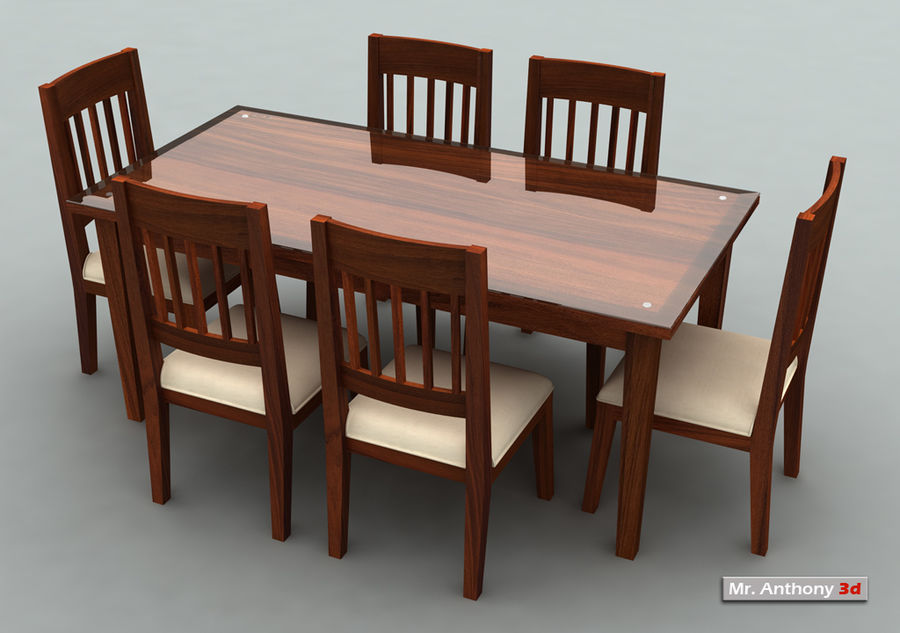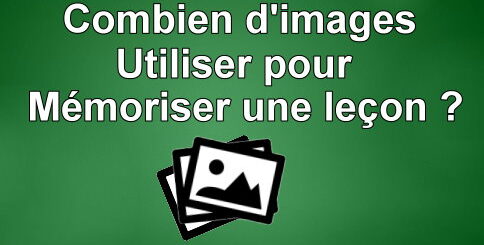Le guide ultime du palais mental (05 étapes pour le créer et le mettre en application dés aujourd’hui)
Publié · Mis à jour
La méthode du palais mental (Loci) est de loin l’une des méthodes les plus célèbres et les plus utilisées quand il s’agit de technique de mémorisation,
Dans cet article je vais vous montrer les 05 étapes pour créer votre premier palais et le mettre en application dès aujourd’hui
Mais avant d’entrer dans les détails expliquant avant le principe de la méthode
1– Le principe de la méthode du palais mental
Le principe de base est de transformer des objets ou endroits que vous connaissez très bien en objet de stockage
Qu’est-ce qu’un objet de stockage ?
Pratiquement toutes les méthodes de mémorisation que je détaille dans ce blog se basent sur ce principe

Convertir une information en une image pour mieux la mémoriser
Exemple
Votre langue est composée de huit muscles entrelacés
Cette information sera maintenant convertie en image

L’information convertie en images sera placée dans un endroit.
Cet endroit est ce que j’appelle un objet de stockage.
Pourquoi avons-nous besoin d’un objet de stockage ?
Imaginez que vous ayez 100 images comme celles ci-dessus représentant 100 informations sur le corps humain
Il est impossible de toutes les garder en mémoire si on ne trouve pas un moyen pour les stocker,
C’est tout le principe de la méthode du palais
La méthode du palais vous permet d’identifier facilement des objets où stocker vos images
2- Identifier les objets de stockage dans son palais mental
Maintenant que vous avez compris le principe de la méthode du palais,
On va voir les étapes pour créer son premier palais mental
Etape 01 : Identifier son palais
Plusieurs endroits peuvent être utilisés comme palais mental
Mais pour débuter le meilleur palais à utiliser sera Votre maison
Nous allons ainsi utiliser votre maison pour identifier des objets de stockages
Etape 02 : Identifier le début et la fin de son palais
Imaginant que ceci représente votre maison vue d’en haut

Ce que vous allez faire c’est choisir un endroit de départ et un endroit de fin de votre palais.
Endroit de départ
Le plus simple est d’utiliser la porte d’entrée de votre maison comme endroit de départ.
C’est par là que commencera votre palais

La porte d’entrée sera aussi votre premier objet de stockage
Endroit de fin du palais
L’endroit de fin de votre palais sera le dernier objet de stockage que vous allez utiliser
Là aussi le plus simple est d’utiliser l’objet le plus éloigné de la porte d’entrée
Dans l’exemple ici ça sera l’armoire au fond

Etape 03 : Choisir les objets de stockage
L’étape suivante est de vous imaginer vous balader dans votre maison en partant de la porte et arrivant jusqu’au dernier objet

La raison pour laquelle nous avions choisi un endroit de départ et de fin
C’est pour identifier le meilleur moyen de parcourir votre palais
En vous imaginant traverser votre maison, vous allez identifier des objets à utiliser

Dans cet exemple j’ai réussi à identifier 20 objets de stockage
Attention
N’utilisez pas de palais virtuel comme dans l’image, il faut utiliser votre propre maison pour identifier les objets.
Les objets choisis seront classés selon un ordre bien précis
La porte est le premier objet de stockage
Les autres seront numérotés suivant votre parcours de la porte au dernier objet de stockage

Etape 04 : Mémoriser la structure de votre palais
Ce qui rebute le plus dans la méthode du palais c’est qu’il faut mémoriser le palais créé
On voit cette étape comme une corvée supplémentaire qui s’ajoute à notre travail
MAIS
Bien que ça puisse prendre un peu de temps pour créer et mémoriser votre palais mental
C’est un investissement qui vous servira pendant le reste de votre vie
J’ai personnellement créé mon premier palais mental en 2012, et je l’utilise encore à ce jour pour y stocker des informations
Créer et mémoriser un palais mental n’est jamais une perte de temps,
Au pire vous aurez toujours des objets libres où stocker de nouvelles informations
Comment mémoriser son palais mental ?
Il y a deux méthodes toutes simples pour mémoriser votre palais rapidement
1-L’écrire
2-L’utiliser
1- Ecrire
En identifiant vos objets de stockage il est important de les écrire en même temps
Ceci permet à la fois de mieux les structurer et plus important encore de les mémoriser
Vous aurez toujours un papier au quel revenir en cas d’oubli
Par exemple en partant du palais virtuel
1- La porte d’entrée
2- Douche
3-Lavabo
4-WC
5-Fenêtre
6- Chaise
…etc.
2- Utiliser
L’un des moyens les plus rapides que j’ai trouvés pour mémoriser un palais est de l’utiliser après l’avoir créé
L’utiliser signifie simplement que vous allez y placer des informations
Exemple

Il est plus facile d’imaginer une langue qui lèche un gigantesque 08 devant votre porte d’entrée que d’imaginer simplement une porte
Quand vous utilisez votre palais vous mémorisez plus facilement les objets de stockage parce que vous les liez à des animations étranges et mémorables
05 Points importants à respecter pour la création du palais mental
Il y a certains points essentiels à prendre en considération quand vous cherchez à créer votre palais mental
01-Quels types d’objets choisir pour mon palais ?
Commencez par utiliser principalement les gros objets faciles à visualiser
La porte
La machine à laver
La télévision
La table
Eviter les objets trop petits pour être bien visualisés
Un interrupteur
Une brosse à dent
Des clés
Une cuillère
02-Combien d’objets choisir par chambre ?
Le mieux est de choisir le même nombre d’objets par chambre
Cela permet une meilleure organisation des informations mémorisées,
Si c’est votre premier palais commencez par 05 objets

Vous pourrez augmenter le nombre d’objets dans chaque chambre par la suite
03-Est-il possible d’utiliser un même objet plusieurs fois ?
Par exemple votre maison ne contient probablement pas qu’une seule chaise
Est-il possible d’utiliser toutes les chaises de votre maison comme objet de stockage ?
Ou cela va-t-il porter à la confusion ?
La réponse à cette question est
Cela dépend de l’emplacement de l’objet
Prenant l’exemple d’une table à manger

Bien qu’elle contienne 05 chaises, il est préférable d’en utiliser qu’une seule ou grand max 2 comme objet de stockage
Ici les objets (chaises) sont à la fois très similaires et très proches, ce qui rend difficile leur visualisation.
Si je devais choisir des objets de stockage en partant de cette table à manger, voilà comment je vais procéder

Je choisis la chaise de gauche, la table, et la chaise de droite.
Par contre contrairement aux chaises, chaque porte de ma maison est utilisée comme objet de stockage
Parce que
Chaque porte est dans un endroit différent et éloigné des autres, leur visualisation est donc plus simple
Utilisez toujours ce principe lors du choix de vos objets de stockage
04-Combien est-il possible d’identifier d’objets de stockage dans un palais ?
Il n’y a pas vraiment de nombre précis à respecter, mais sachez que
Plus votre palais contient d’objets de stockage plus vous pourrez y mettre plus d’informations
Votre objectif serait de pouvoir identifier de 50 à 100 objets dans votre maison
Par exemple dans ma maison j’ai réussi à identifier 120 objets de stockage
En pratique cela me permet de mémoriser un minimum de 120 informations

Bien sûr en utilisant les autres techniques le nombre d’informations qu’on peut mémoriser sera doublé ou triplé
05-De combien de palais j’aurais besoin ?
Là aussi il n’y a pas de réponse exacte
Cela dit plus vous aurez de palais disponible plus vous pourrez mémoriser d’informations rapidement
Mais si je devais recommander un chiffre je dirais au minium 03 palais avec une centaine d’objets de stockage chacun
Pour ma part ces 03 palais sont
Ma maison
La maison de mon oncle
La maison de mon ami
Conclusion
Bien que cet article soit long, je n’ai qu’effleuré la puissance de cette méthode,
Et je vais évidemment vous parler des autres aspects de son application dans de prochains articles




узнать больше https://xn—–6kcacs9ajdmhcwdcbwwcnbgd13a.xn--p1ai/prajs-list
на этом сайте https://falcoware.com/rus/match3_games.php
It’s appropriate time to make some plans for the future and it’s time to be happy. I’ve read this post and if I could I desire to suggest you few interesting things or suggestions. Maybe you can write next articles referring to this article. I wish to read more things about it!
WASHINGTON — “Liberation Day” just gave way to Capitulation Day.
[url=https://skyiwredshjnhjgeleladu7m7mgpuxgsnfxzhncwtvmhr7l5bniutayd-onion.com]skyiwredshjnhjgeleladu7m7mgpuxgsnfxzhncwtvmhr7l5bniutayd[/url]
President Donald Trump pulled back Wednesday on a series of harsh tariffs targeting friends and foes alike in an audacious bid to remake the global economic order.
Trump’s early afternoon announcement followed a harrowing week in which Republican lawmakers and confidants privately warned him that the tariffs could wreck the economy. His own aides had quietly raised alarms about the financial markets before he suspended a tariff regime that he had unveiled with a flourish just one week earlier in a Rose Garden ceremony.
Follow live politics coverage here
[url=https://skyiwredshjnhjgeleladu7m7mgpuxgsnfxzhncwtvmhr7l5bniutayd.net]skyiwredshjnhjgeleladu7m7mgpuxgsnfxzhncwtvmhr7l5bniutayd onion[/url]
The stock market rose immediately after the about-face, ending days of losses that have forced older Americans who’ve been sinking their savings into 401(k)s to rethink their retirement plans.
Ahead of Trump’s announcement, some of his advisers had been in a near panic about the bond markets, according to a senior administration official. Interest rates on 10-year Treasury bonds had been rising, contrary to what normally happens when stock prices fall and investors seek safety in treasuries. The unusual dynamic meant that at the same time the tariffs could push up prices, people would be paying more to buy homes or pay off credit card debt because of higher interest rates. Businesses looking to expand would pay more for new loans.
[url=https://skyiwredshjnhjgeleladu7m7mgpuxgsnfxzhncwtvmhr7l5bniutayd.net]btrhbfeojofxcpxuwnsp5h7h22htohw4btqegnxatocbkgdlfiawhyid onion[/url]
Two of Trump’s most senior advisers, Treasury Secretary Scott Bessent and Commerce Secretary Howard Lutnick, presented a united front Wednesday, urging him to suspend the tariffs in light of the bond market, the administration official said.
In a social media post, Trump announced a 90-day pause that he said he’ll use to negotiate deals with dozens of countries that have expressed openness to revising trade terms that he contends exploit American businesses and workers. One exception is China. Trump upped the tariff on the country’s biggest geopolitical rival to 125%, part of a tit-for-tat escalation in an evolving trade war.
Trump reversed course one week after he appeared in the Rose Garden and unveiled his plan to bring jobs back to the United States. Displaying a chart showing the new, elevated tariffs that countries would face, Trump proclaimed, “My fellow Americans, this is Liberation Day.”
skyiwredshjnhjgeleladu7m7mgpuxgsnfxzhncwtvmhr7l5bniutayd onion
https://skyiwredshjnhjgeleladu7m7mgpuxgsnfxzhncwtvmhr7l5bniutayd.org
President Donald Trump wants to bring back American manufacturing in ways that would reshape the United States economy to look more like China’s. The campaign, which has led to a rapidly escalating trade war with China, has given ample social media fodder to Chinese and American observers alike.
bsme at
Announcing a series of sweeping tariffs in a move dubbed “Liberation Day,” Trump said last week that it will lead factories to move production back to American shores, boosting the U.S. economy after “foreign leaders have stolen our jobs, foreign cheaters have ransacked our factories, and foreign scavengers have torn apart our once beautiful American dream.”
bsme.at
In a Truth Social post Wednesday, Trump announced that he is raising tariffs on goods imported from China to 125%, up from the 104% that took effect the same day, due to “the lack of respect that China has shown to the World’s Markets.” Higher targeted tariffs on other countries have been paused for 90 days, although the 10% baseline tariff will remain in place for all countries.
bs2best
Meme-makers and Chinese government officials have in recent days begun pointing out the irony of Trump’s tariff-driven manufacturing pivot through AI-generated satire and political cartoons that have percolated online, with many American users boosting the jokes.
bs2best
https://lbsme.at
найти это электрик томск
подробнее здесь электрик томск
перейти на сайт электрик томск
kraken – kraken зеркало, kraken shop
kra32.at – Площадка кракен, kra30 cc
нажмите казино р7 ссылка
кракен клир – kraken32, кракен даркнет
kraken32 – kraken ссылка, kraken shop
kra cc – Kra30.cc, kraken официальный сайт
кракен официальная ссылка – kra30 сс, кракен войти
‘A whole different mindset’
Accurate clockwork is one matter. But how future astronauts living and working on the lunar surface will experience time is a different question entirely.
kra30cc
On Earth, our sense of one day is governed by the fact that the planet completes one rotation every 24 hours, giving most locations a consistent cycle of daylight and darkened nights. On the moon, however, the equator receives roughly 14 days of sunlight followed by 14 days of darkness.
“It’s just a very, very different concept” on the moon, Betts said. “And (NASA is) talking about landing astronauts in the very interesting south polar region (of the moon), where you have permanently lit and permanently shadowed areas. So, that’s a whole other set of confusion.”
https://kra30c.cc
kraken tor
“It’ll be challenging” for those astronauts, Betts added. “It’s so different than Earth, and it’s just a whole different mindset.”
That will be true no matter what time is displayed on the astronauts’ watches.
Still, precision timekeeping matters — not just for the sake of scientifically understanding the passage of time on the moon but also for setting up all the infrastructure necessary to carry out missions.
The beauty of creating a time scale from scratch, Gramling said, is that scientists can take everything they have learned about timekeeping on Earth and apply it to a new system on the moon.
And if scientists can get it right on the moon, she added, they can get it right later down the road if NASA fulfills its goal of sending astronauts deeper into the solar system.
“We are very much looking at executing this on the moon, learning what we can learn,” Gramling said, “so that we are prepared to do the same thing on Mars or other future bodies.”
Space, time: The continual question
If time moves differently on the peaks of mountains than the shores of the ocean, you can imagine that things get even more bizarre the farther away from Earth you travel.
kra31cc
To add more complication: Time also passes slower the faster a person or spacecraft is moving, according to Einstein’s theory of special relativity.
Astronauts on the International Space Station, for example, are lucky, said Dr. Bijunath Patla, a theoretical physicist with the US National Institute of Standards and Technology, in a phone interview. Though the space station orbits about 200 miles (322 kilometers) above Earth’s surface, it also travels at high speeds — looping the planet 16 times per day — so the effects of relativity somewhat cancel each other out, Patla said. For that reason, astronauts on the orbiting laboratory can easily use Earth time to stay on schedule.
https://kra30c.cc
kraken сайт
For other missions — it’s not so simple.
Fortunately, scientists already have decades of experience contending with the complexities.
Spacecraft, for example, are equipped with their own clocks called oscillators, Gramling said.
“They maintain their own time,” Gramling said. “And most of our operations for spacecraft — even spacecraft that are all the way out at Pluto, or the Kuiper Belt, like New Horizons — (rely on) ground stations that are back on Earth. So everything they’re doing has to correlate with UTC.”
But those spacecraft also rely on their own kept time, Gramling said. Vehicles exploring deep into the solar system, for example, have to know — based on their own time scale — when they are approaching a planet in case the spacecraft needs to use that planetary body for navigational purposes, she added.
For 50 years, scientists have also been able to observe atomic clocks that are tucked aboard GPS satellites, which orbit Earth about 12,550 miles (20,200 kilometers) away — or about one-nineteenth the distance between our planet and the moon.
Studying those clocks has given scientists a great starting point to begin extrapolating further as they set out to establish a new time scale for the moon, Patla said.
“We can easily compare (GPS) clocks to clocks on the ground,” Patla said, adding that scientists have found a way to gently slow GPS clocks down, making them tick more in-line with Earth-bound clocks. “Obviously, it’s not as easy as it sounds, but it’s easier than making a mess.”
‘A whole different mindset’
Accurate clockwork is one matter. But how future astronauts living and working on the lunar surface will experience time is a different question entirely.
kra31 cc
On Earth, our sense of one day is governed by the fact that the planet completes one rotation every 24 hours, giving most locations a consistent cycle of daylight and darkened nights. On the moon, however, the equator receives roughly 14 days of sunlight followed by 14 days of darkness.
“It’s just a very, very different concept” on the moon, Betts said. “And (NASA is) talking about landing astronauts in the very interesting south polar region (of the moon), where you have permanently lit and permanently shadowed areas. So, that’s a whole other set of confusion.”
https://kra30c.cc
kra30cc
“It’ll be challenging” for those astronauts, Betts added. “It’s so different than Earth, and it’s just a whole different mindset.”
That will be true no matter what time is displayed on the astronauts’ watches.
Still, precision timekeeping matters — not just for the sake of scientifically understanding the passage of time on the moon but also for setting up all the infrastructure necessary to carry out missions.
The beauty of creating a time scale from scratch, Gramling said, is that scientists can take everything they have learned about timekeeping on Earth and apply it to a new system on the moon.
And if scientists can get it right on the moon, she added, they can get it right later down the road if NASA fulfills its goal of sending astronauts deeper into the solar system.
“We are very much looking at executing this on the moon, learning what we can learn,” Gramling said, “so that we are prepared to do the same thing on Mars or other future bodies.”
Lunar clockwork
What scientists know for certain is that they need to get precision timekeeping instruments to the moon.
kraken войти
Exactly who pays for lunar clocks, which type of clocks will go, and where they’ll be positioned are all questions that remain up in the air, Gramling said.
“We have to work all of this out,” she said. “I don’t think we know yet. I think it will be an amalgamation of several different things.”
https://kra30c.cc
kra31cc
Atomic clocks, Gramling noted, are great for long-term stability, and crystal oscillators have an advantage for short-term stability.
“You never trust one clock,” Gramling added. “And you never trust two clocks.”
Clocks of various types could be placed inside satellites that orbit the moon or perhaps at the precise locations on the lunar surface that astronauts will one day visit.
As for price, an atomic clock worthy of space travel could cost around a few million dollars, according Gramling, with crystal oscillators coming in substantially cheaper.
But, Patla said, you get what you pay for.
“The very cheap oscillators may be off by milliseconds or even 10s of milliseconds,” he added. “And that is important because for navigation purposes — we need to have the clocks synchronized to 10s of nanoseconds.”
A network of clocks on the moon could work in concert to inform the new lunar time scale, just as atomic clocks do for UTC on Earth.
(There will not, Gramling added, be different time zones on the moon. “There have been conversations about creating different zones, with the answer: ‘No,’” she said. “But that could change in the future.”)
Space, time: The continual question
If time moves differently on the peaks of mountains than the shores of the ocean, you can imagine that things get even more bizarre the farther away from Earth you travel.
kra30 cc
To add more complication: Time also passes slower the faster a person or spacecraft is moving, according to Einstein’s theory of special relativity.
Astronauts on the International Space Station, for example, are lucky, said Dr. Bijunath Patla, a theoretical physicist with the US National Institute of Standards and Technology, in a phone interview. Though the space station orbits about 200 miles (322 kilometers) above Earth’s surface, it also travels at high speeds — looping the planet 16 times per day — so the effects of relativity somewhat cancel each other out, Patla said. For that reason, astronauts on the orbiting laboratory can easily use Earth time to stay on schedule.
https://kra30c.cc
kra30 cc
For other missions — it’s not so simple.
Fortunately, scientists already have decades of experience contending with the complexities.
Spacecraft, for example, are equipped with their own clocks called oscillators, Gramling said.
“They maintain their own time,” Gramling said. “And most of our operations for spacecraft — even spacecraft that are all the way out at Pluto, or the Kuiper Belt, like New Horizons — (rely on) ground stations that are back on Earth. So everything they’re doing has to correlate with UTC.”
But those spacecraft also rely on their own kept time, Gramling said. Vehicles exploring deep into the solar system, for example, have to know — based on their own time scale — when they are approaching a planet in case the spacecraft needs to use that planetary body for navigational purposes, she added.
For 50 years, scientists have also been able to observe atomic clocks that are tucked aboard GPS satellites, which orbit Earth about 12,550 miles (20,200 kilometers) away — or about one-nineteenth the distance between our planet and the moon.
Studying those clocks has given scientists a great starting point to begin extrapolating further as they set out to establish a new time scale for the moon, Patla said.
“We can easily compare (GPS) clocks to clocks on the ground,” Patla said, adding that scientists have found a way to gently slow GPS clocks down, making them tick more in-line with Earth-bound clocks. “Obviously, it’s not as easy as it sounds, but it’s easier than making a mess.”